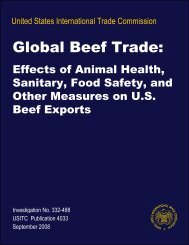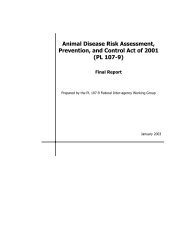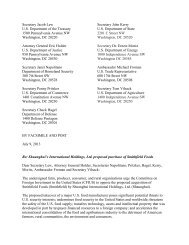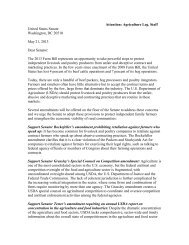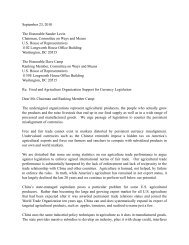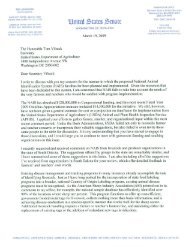Exhibit 8, 100416 Brazil FMD Risk Evaluation - R-Calf
Exhibit 8, 100416 Brazil FMD Risk Evaluation - R-Calf
Exhibit 8, 100416 Brazil FMD Risk Evaluation - R-Calf
You also want an ePaper? Increase the reach of your titles
YUMPU automatically turns print PDFs into web optimized ePapers that Google loves.
kept, with the documentation being available for auditing in the involved States (presentation<br />
CIDASC). Owners have been duly compensated in all animal sanitary emergency activities carried<br />
out in <strong>Brazil</strong> [11].<br />
Garbage control/swill feeding<br />
Swill feeding to swine is prohibited in all regions of <strong>Brazil</strong> by Decree No. 201, issued May 1998 [5].<br />
State laws in Santa Catarina also prohibit garbage feeding. Although Federal law allows some<br />
feeding with inactivation of waste, this practice is forbidden by Santa Catarina State law. Official<br />
veterinarians at the Seara local office reported that if they identified garbage feeding during a farm<br />
visit they would provide guidance and a verbal warning to stop it. Upon a second finding they<br />
would issue a fine; however, the officials reported that this has never been necessary[11].<br />
Conclusions:<br />
APHIS considers that MAPA has sufficient legal authority to carry out official disease control,<br />
eradication, and quarantine activities. MAPA has a system of official veterinarians and support staff<br />
in place for carrying out field programs and for import controls and animal quarantine. Review of<br />
veterinary infrastructure with MAPA and CIDASC officials demonstrated an infrastructure adequate<br />
for rapid detection of <strong>FMD</strong>, CSF, ASF, and SVD and for carrying out surveillance programs in<br />
Santa Catarina. The technical infrastructure is adequate, and officials use advanced technologies to<br />
conduct animal health programs.<br />
Santa Catarina’s LVU offices are adequately staffed. Assuming that the offices visited during the<br />
site visit are representative of LVUs throughout the State, the local contacts, coverage, and control<br />
mechanisms are strong. LVU functions observed in relatively high-risk regions demonstrated close<br />
contact with individual premises in the regions and strong local controls. LVU personnel appeared<br />
to be adequately trained in identifying the clinical signs of <strong>FMD</strong>, SVD, ASF, and CSF. In addition<br />
they have a close relationship with animal producers and private/company veterinarians in charge of<br />
cooperative farms. All parties are willing to report suspicious incidents to the next level. LVU<br />
personnel also regularly provide information on disease signs and reporting requirements to<br />
producers within their coverage area. It is expected that producers would suspect any of the diseases<br />
under evaluation if they were to see them.<br />
During our site visits to <strong>Brazil</strong> in 2002, 2003, 2006, and 2008, APHIS received overviews of the<br />
activities and structures of Federal, State and local authorities. APHIS reviewed premises<br />
registration, census information, vaccination records, and movement control documents. Our<br />
personnel visited farms to observe farming practices. Officials observed that the structure,<br />
effectiveness, and organization of the LVUs in Santa Catarina were adequate to perform official<br />
animal health functions [6, 11].<br />
With regard to indemnity procedures, APHIS concluded that sufficient funds are available to<br />
compensate owners for sacrificed animals. In addition, indemnity provisions can be extended to<br />
exposed and contact animals. Livestock producers and other industry groups contribute to and<br />
administer private compensation funds, which show the level of commitment and participation of the<br />
cattle industry in <strong>FMD</strong> program activities and of the swine industry to <strong>FMD</strong>, CSF, SVD, and ASF<br />
APHIS <strong>Evaluation</strong> of the Status of the <strong>Brazil</strong>ian State of Santa Catarina 19



